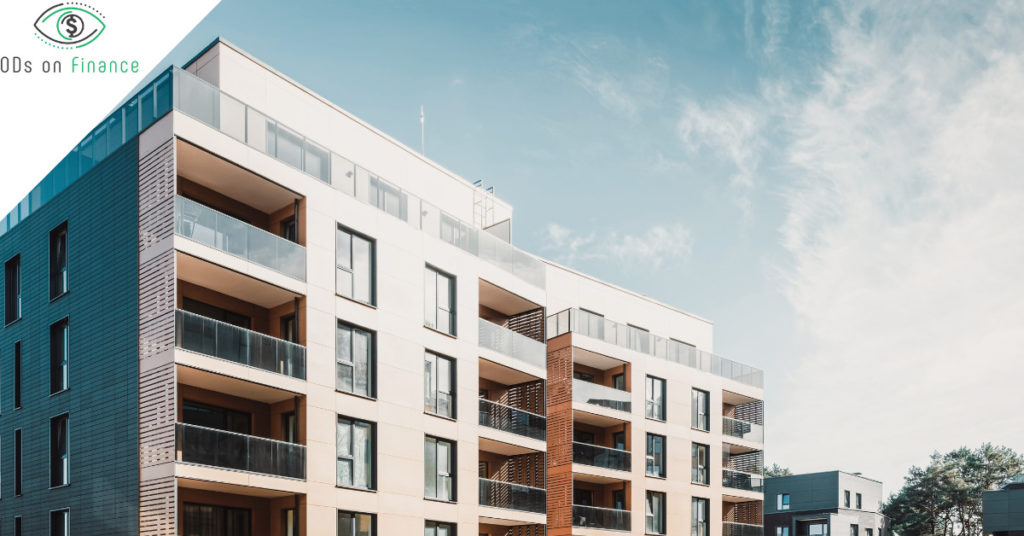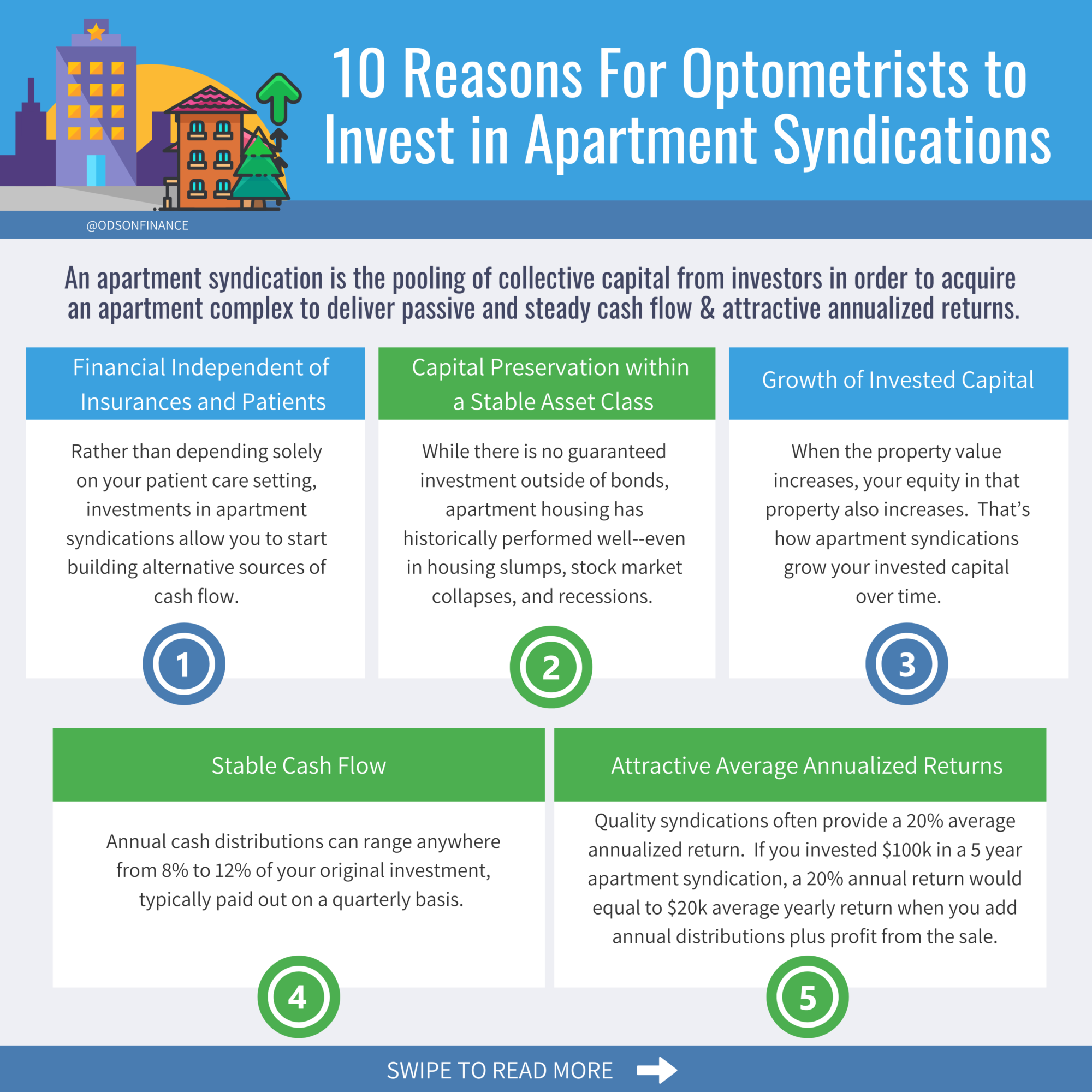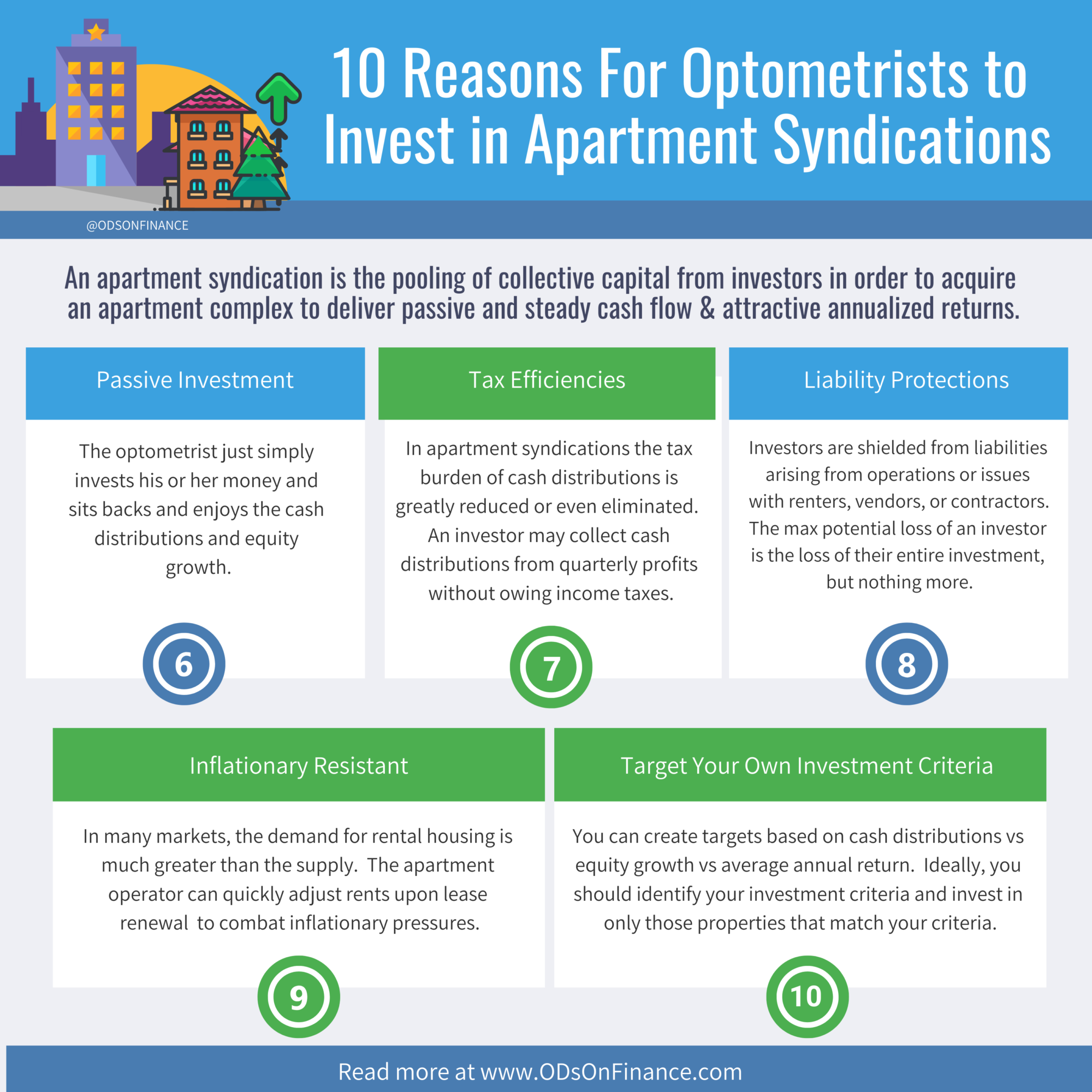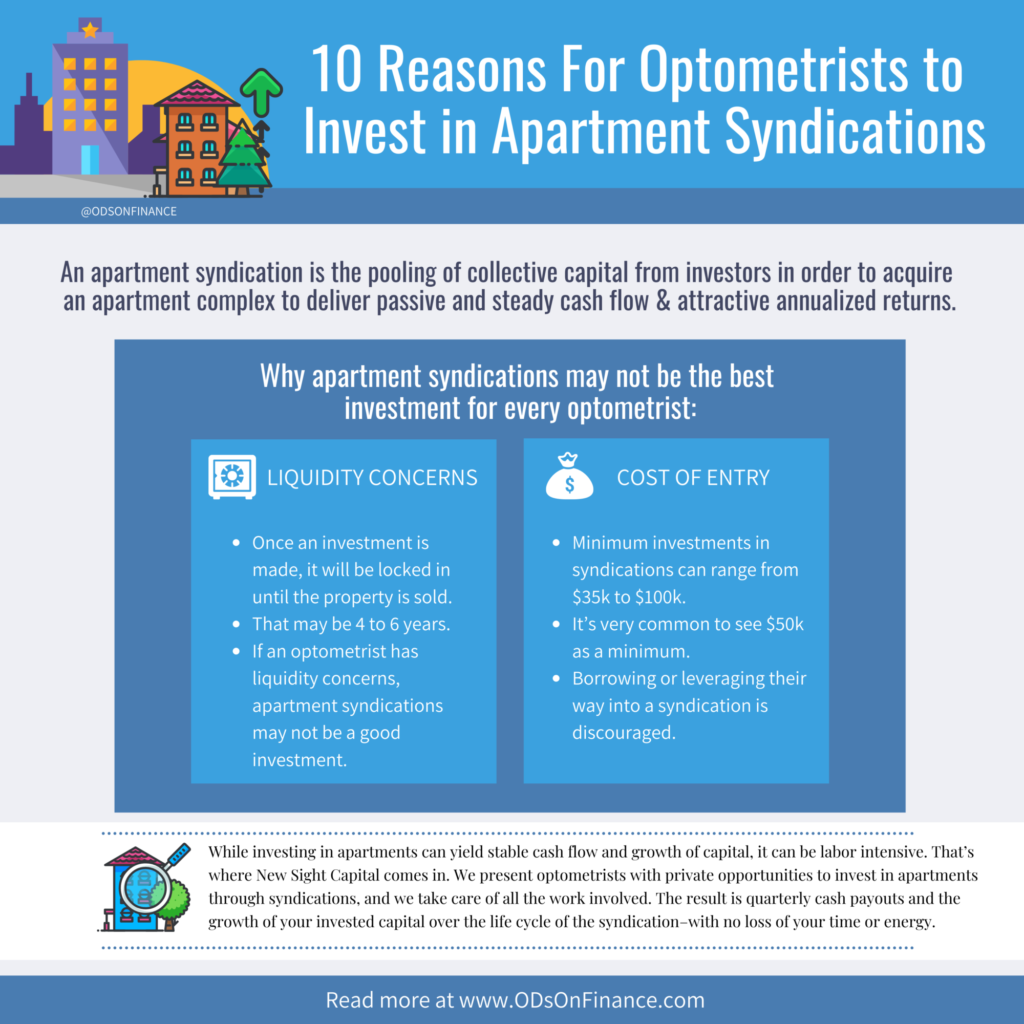10 Reasons For Optometrists to Invest in Apartment Syndications & 2 Reasons to Not Invest in Apartment Syndications

Editor’s Note: This is a guest post written by Walt Whitley, O.D. and Russ Beach, O.D. of New Sight Capital. Aaron and Dat are extremely strict about guest requirements in that they must be educational and informative to our readers. Every guest post is vetted, read and upheld to the highest standards of ODsonFinance. Your trust is the most valuable factor to us. We like having experts in their field write on our website, enjoy and give us feedback!
KEY POINTS:
-
(1) Establish Financial Wellness Independent of Insurances and Patients
-
(2) Capital Preservation within a Stable Asset Class
-
(3) Growth of Invested Capital
-
(4) Stable Cash Flow 8-12%
-
(5) Attractive Average Annualized Returns ~20%
-
(6) Passive Investment
-
(7) Tax Efficiencies
-
(8) Liability Protections
-
(9) Inflationary Resistant
-
(10) Target Your Own Investment Criteria
-
(1) Illiquidity
-
(2) Cost of Entry ($35K to 50K Minimum)
When we started New Sight Capital, we set out on a mission to share the unique opportunity of apartment investing with our fellow optometrists. The challenge: not many ODs have ever heard of apartment syndications. In short, an apartment syndication is the pooling of collective capital from investors in order to acquire an apartment complex that would normally be reserved to larger, institutional investors. Although syndications have been around for years, they’ve typically been an instrument of very wealthy or well-connected accredited investors. We are setting out to change that by bringing syndications directly to the optometric community.
10 reasons For Optometrists to Invest in Apartment Syndications
(1) Establish Financial Wellness Independent of Insurances and Patients
You probably love patients. Maybe not all of them, but most of them. You probably don’t love insurances, but you understand they are a necessary evil within the eyecare ecosystem. Yet, there’s no denying the tension that often exists between patient and insurance and optometrist. We’ve all had that patient that says the kindest, most amazing things about us. But, when their insurance changes to a plan of which you’re not a provider, you’ll never hear from them again. Then there’s your rising expenses juxtaposed against stagnant, if not decreasing, insurance reimbursements.
Given the financial tension of this patient-insurance-optometrist dynamic, it’s very wise to take a more global, long-term approach to the sources of your income. Rather than depending solely on your patient care setting, investments in apartment syndications allow you to start building alternative sources of cash flow. When a VSP or Medicare audit comes knocking; when patients don’t pay their deductibles; when the largest employer in town switches to the lowest tier vision plan...it’s reassuring to be receiving income on a regular basis from a source far removed from patients and insurances.
(2) Capital Preservation within a Stable Asset Class
While cash distributions and investment return metrics grab the eyes of most investors, we at New Sight Capital think one of the biggest reasons to invest in apartment syndications is capital preservation. Yes, cash flow and growing your investments are important, but we think making sure you don’t lose money is even more important. When the stock market lights up with volatility, it’s the stability of apartment housing that provides investors an unique opportunity to preserve their invested capital. While there is no guaranteed investment outside of bonds, apartment housing has historically performed well--even in housing slumps, stock market collapses, and recessions. The reason: everyone needs housing, not everyone can or will buy a home, and there are always roadblocks that prevent apartment supply from ever catching up to demand. This makes carefully selected apartment investments one of the more unique ways to preserve capital while enjoying a bunch of other key benefits.
Financial Pearl
"When the stock market lights up with volatility, it’s the stability of apartment housing that provides investors an unique opportunity to preserve their invested capital. While there is no guaranteed investment outside of bonds, apartment housing has historically performed well--even in housing slumps, stock market collapses, and recessions. The reason: everyone needs housing!"
(3) Growth of Invested Capital
While we always keep capital preservation in mind when we underwrite deals to bring to investors, we must also seek offerings that will grow your investment. Apartment investments have a secret weapon: forced appreciation! In the housing market, your home is valued relative to comparable sales around it. If they sell for higher prices, your home naturally appreciates. However, apartments are valued based on the Net Operating Income (NOI). As the NOI increases, the value of the property increases. New Sight Capital often seeks out apartments that we determine have ample room for improvement in their NOI. By improving the property, raising rents, decreasing expenses, and installing better management - we can effectively force appreciation in the value of the property by increasing NOI. When the property value increases, your equity in that property also increases. That’s how apartment syndications grow your invested capital over time.
(4) Stable Cash Flow
Another good reason for optometrists to invest in apartment syndications is cash flow. As an investor, you are entitled to preferential treatment in the distributions of profits. In fact, most syndications pay distributions to a preferred target and the investors still receive 70% of cash flow beyond that target. Annual cash distributions can range anywhere from 8% to 12% of your original investment--typically paid out on a quarterly basis. Quality syndications are underwritten with very conservative parameters to help ensure these distributions hold up even when accounting for potential headwinds that may affect the property or the market. And while there are no guarantees, it’s often the cash flow from syndications that draws the attention of most investors.
Financial Pearl
"As a syndication investor, you are entitled to preferential treatment in the distributions of profits. In fact, most syndications pay distributions to a preferred target and the investors still receive 70% of cash flow beyond that target. Annual cash distributions can range anywhere from 8% to 12% of your original investment--typically paid out on a quarterly basis.
If we include cash distributions and profit from the sale of the property. Quality syndications often provide a 20% average annualized return"
(5) Attractive Average Annualized Returns
There’s a lot of return metrics thrown around in the investing world, but one that should get attention when considering apartment syndications is average annualized return. This is the annualized return you get when you include cash distributions and profit from the sale of the property. Quality syndications often provide a 20% average annualized return. Let’s say you invested $100k in a 5 year apartment syndication, a 20% annual return would amount to $20k average yearly return when you add annual distributions plus profit from the sale. Total return would be $100k, plus the return of your original $100k investment. That’s an annual return that is better than the stock market over the past 20 years.
(6) Passive Investment
We think one of the most liberating aspects of apartment syndications is they provide cash flow and wealth growth with absolutely no effort on your part. Optometrists are busy folks with very little time for side hustles. But, apartment syndications are a completely passive investment. Whether you are spinning dials or chasing the tsetse fly around the ora serrata, you won’t have to divert any of your time to run your investment in syndications. The general partners or sponsors of the syndication are tasked with hiring asset and property managers to effectively execute the business plan and address all operational aspects. The optometrist just simply invests his or her money and sits backs and enjoys the cash distributions and equity growth.
(7) Tax Efficiencies
If you’ve ever read “Rich Dad, Poor Dad,” you’ll probably remember the assertion that the wealthiest in this country pay very little taxes--because of the tax efficiencies of their real estate investments. There’s a lot of truth to that due to the magic of depreciation, which is a non-operating expense used to decrease tax burdens. If you own a practice, you may already understand the power of depreciation. Apartments have a special advantage because they also can create accelerated depreciation, which allows for a cost segregation study to divide the components of the property into categories that can then be depreciated in the first several years rather than over the decades. That allows apartment syndications to front load most of the depreciation and create a scenario where the tax burden of cash distributions is greatly reduced or even eliminated. There exists the potential that an investor may collect cash distributions from quarterly profits without owing income taxes.
We must be careful to state that we are not accountants or financial advisers. We are simply stating observations from our experiences. It’s wise for every investor to consult their CPA or tax advisor for professional advice. Certainly, this is not to say that investment returns with apartment syndications are not subject to tax. In fact, the gains that an investor realizes once the property is sold is subject to capital gains. Even then, those gains may be 1031 exchanged into another syndication or real estate investment to further defer or delay taxes.
(8) Liability Protections
Another important benefit of investing in an apartment syndication is the liability protections afforded to the investor. A syndication is legally structured as an LLC formed with the sole purpose of acquiring and operating a single apartment property. There are 2 categories of owners in this LLC: general partners and limited partners.
- The individuals or entities sponsoring and running the syndication are the general partners.
- The investors are given equity as limited partners.
The benefit of that structure is that the limited partners have no legal exposure to liabilities. They are shielded from liabilities arising from operations or issues with renters, vendors, or contractors. Limited partners are also not signing on any debt or loans, so they are not exposed to liabilities that could arise in the case of default. The max potential loss of an investor is the loss of their entire investment--but nothing more.
(9) Inflationary Resistant
(10) Target Your Own Investment Criteria
As an optometrist, you’re very well aware of the impact of inflation. It can influence your operations costs, costs of goods, and your patients’ ability to afford those goods and services. One key benefit of apartment properties is that they tend to be inflationary resistant. This is from a combination of two key factors:
- (1) Supply/demand
- (2) Short term leases.
In many markets, the demand for rental housing is much greater than the supply. There are simply too many regulations and costs involved in improving supply. That lopsided demand allows apartment operators more runway for increasing rents. The relatively short term nature of leases allows these rent raises to be more frequent and responsive to the impact of rising costs. In essence, the apartment operator can quickly adjust rents upon lease renewal to combat inflationary pressures.
2 Reasons For Optometrists NOT to Invest in Apartment Syndications
While we think all of the above reasons point to why apartment syndications are great investments for most optometrists, we also believe they may not be the best investment for every optometrist. That may sound surprising, but the reality is that no one investment is the right fit for every investor.
(1) Illiquidity
First, an optometrist in apartment syndications must be comfortable with the illiquid nature of syndication investments. Once an investment is made, it will be locked in until the property is sold. That may be 4 to 6 years. If an optometrist has liquidity concerns, apartment syndications may not be a good investment.
(2) Cost of Entry
Another reason why syndications may not be a best fit for someone is the cost of entry. While minimum investments in syndications can range from $35k to $100k, it’s very common to see $50k as a minimum. We encourage ODs to consider whether or not they can afford to make that investment, and we completely discourage investors from borrowing or leveraging their way into a syndication. If the investment minimum leaves you with very little survival liquidity, then syndications are not the appropriate investment.
Summary
While apartment “funds” exist, apartment syndications are typically offerings to invest in a specific property. That allows you the opportunity to invest only in the properties that align with your investment criteria and risk tolerance. For instance, an offering to invest in a value-add property in Mobile, AL is a different opportunity than a brand new apartment property in Bradenton, FL. Value-add offerings (rehabbing the property in order to increase rents/value) typically pay higher annual distributions to investors. However, some investors may be willing to accept lower annual distributions in order to invest in a more stable market or less complicated business plan. You can also create targets based on cash distributions vs equity growth vs average annual return. Ideally, you should identify your investment criteria and invest in only those properties that match your criteria.
New Sight Capital was founded by Walt Whitley, O.D. and Russ Beach, O.D. who understand the demands a busy career puts on your time and your ability to grow your wealth. You’ve worked hard for your prosperity, and you want to enjoy life to the fullest with your loved ones. You may also not want to depend on patients and insurance for all of your income any more. While investing in apartments can yield stable cash flow and growth of capital, it can be labor intensive. That’s where New Sight Capital comes in. We present optometrists with private opportunities to invest in apartments through syndications, and we take care of all the work involved. The result is quarterly cash payouts and the growth of your invested capital over the life cycle of the syndication–with no loss of your time or energy.
To learn more about syndications for ODs visit our website at www.newsightcapital.com
Financial Pearl
"Syndications may not be a best fit for an optometrist is the cost of entry. While minimum investments in syndications can range from $35k to $100k, it’s very common to see $50k as a minimum. We encourage ODs to consider whether or not they can afford to make that investment, and we completely discourage investors from borrowing or leveraging their way into a syndication"
Want to learn about Real Estate Investments? Check out Recommended RE Investments
Want to get a full blueprint on how to start? Check our REI Articles
Related Articles
- « Previous
- 1
- 2
- 3






Facebook Comments